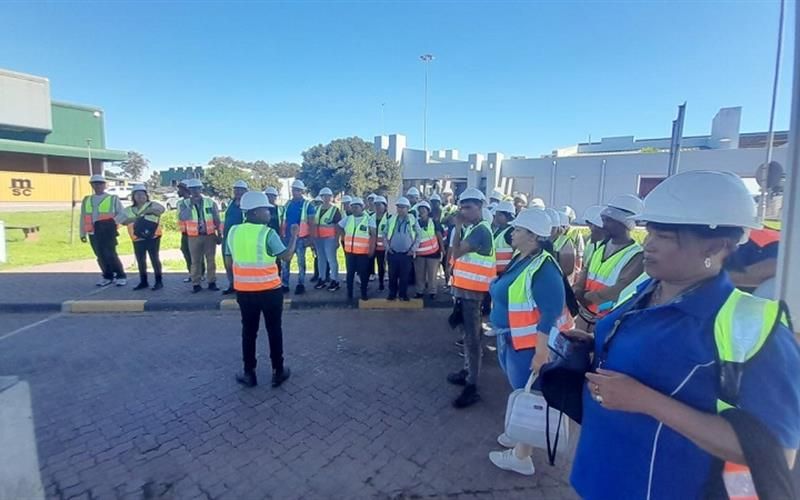Cape Town is facing an increase in criminal activities targeting waste management services, with criminals extorting money from the city and threatening to attack waste collection employees if their demands are not met. This has forced the city to temporarily suspend collection services in affected neighborhoods and request the South African Police Service to investigate. The city encourages residents to stay informed and support its staff, and asks for their help in providing valuable information to the authorities. Through cooperation and vigilance, the city and its citizens can overcome this challenge and preserve the cleanliness and beauty of Cape Town.
Criminal Threats Disrupting Waste Collection Services
Recently, the beautiful city of Cape Town has faced an alarming rise in criminal activities targeting its waste management services. Various parts of the city, such as Gugulethu, Philippi East/Lower Crossroads, and Nyanga, have seen criminals extorting protection money from the City of Cape Town. They threaten to attack waste collection employees if the City does not comply with their demands.
This alarming situation has forced the City to take preventive measures like temporarily suspending collection services in the affected neighborhoods. In Gugulethu, for instance, collection teams reported incidents of being trailed by vehicles carrying armed individuals. Understandably, these incidents have caused unease among City staff members and highlighted the urgency to find a solution.
Alderman Grant Twigg, the Mayoral Committee Member for Urban Waste Management, has urgently requested the South African Police Service (SAPS) to investigate and apprehend these criminals. Twigg stresses the importance of not letting criminals undermine service delivery in this way, as it significantly hampers the City’s capacity to maintain cleanliness and order.
Coordinated Efforts to Restore Services and Ensure Safety
The City’s Urban Waste Management (UWM) Directorate is diligently exploring various options to reinstate services as quickly as possible. They are collaborating with the Safety and Security Directorate to formulate suitable strategies that will safeguard waste collection staff and reassure worried citizens.
In the interim, the City encourages residents to refrain from dumping uncollected waste and to stay informed about updates concerning the clearing of existing backlogs or potential adjustments to waste collection schedules. The City’s social media channels offer an excellent source of information for residents seeking current updates on the situation.
To support staff members impacted by these incidents, the City provides counseling services to help them manage any trauma or anxiety they may be experiencing.
Challenges Beyond Extortion and the Role of Citizens
Regrettably, extortion is not the only issue plaguing Cape Town’s waste collection services. In Manenberg, a recent surge in gang violence has forced the temporary suspension of services until the situation stabilizes. The City acknowledges that any backlogs created by this situation will be cleared as soon as the UWM deems it safe to continue operations.
The residents of Cape Town have a crucial role to play in addressing these challenges by providing valuable information to the authorities. The City has set up a dedicated 24-hour tip-off line at 0800 110077, where residents can share information that may lead to successful arrests, recovery of stolen items, or the confiscation of illegal goods. Informants who provide useful information can receive rewards and remain anonymous to ensure their safety.
A United Front Against Criminal Threats to Waste Management Services
Cape Town, a city with a rich history of overcoming various challenges, now faces a new obstacle in the form of criminal threats to its waste management services. It is crucial for the City, its residents, and law enforcement to collaborate in tackling this issue and preserving the cleanliness, order, and beauty that Cape Town is known for. Through strategic planning, cooperation, and vigilance, the City and its citizens can work together to ensure that these criminal threats do not hinder the essential services Cape Town depends on.
1. What is happening to waste management services in Cape Town?
Criminals are extorting money from the city and threatening to attack waste collection employees if their demands are not met, leading to a temporary suspension of collection services in affected neighborhoods.
2. What areas have been affected by these criminal activities?
Various parts of the city, such as Gugulethu, Philippi East/Lower Crossroads, and Nyanga, have seen criminals extorting protection money from the City of Cape Town.
3. What preventive measures has the City taken?
The City has temporarily suspended collection services in affected neighborhoods and requested the South African Police Service to investigate.
4. What is being done to restore services and ensure safety?
The City’s Urban Waste Management (UWM) Directorate is collaborating with the Safety and Security Directorate to formulate suitable strategies that will safeguard waste collection staff and reassure worried citizens.
5. How can residents stay informed about updates concerning waste collection services?
The City’s social media channels offer an excellent source of information for residents seeking current updates on the situation.
6. What is the role of citizens in addressing these challenges?
Residents can provide valuable information to the authorities through a dedicated 24-hour tip-off line at 0800 110077, leading to successful arrests, recovery of stolen items, or the confiscation of illegal goods. Informants who provide useful information can receive rewards and remain anonymous to ensure their safety.
7. What other challenges are facing waste management services in Cape Town?
In Manenberg, a recent surge in gang violence has forced the temporary suspension of services until the situation stabilizes. The City acknowledges that any backlogs created by this situation will be cleared as soon as the UWM deems it safe to continue operations.
8. How can the City and its citizens work together to overcome this challenge?
Through strategic planning, cooperation, and vigilance, the City and its citizens can work together to ensure that criminal threats do not hinder the essential services Cape Town depends on. The City encourages residents to stay informed and support its staff and asks for their help in providing valuable information to the authorities.








